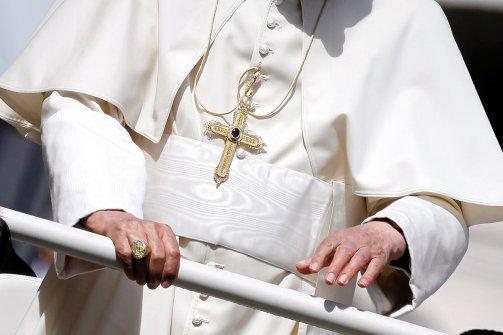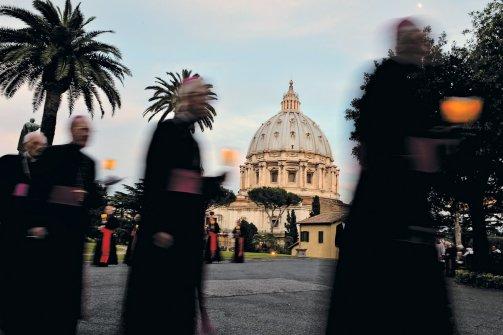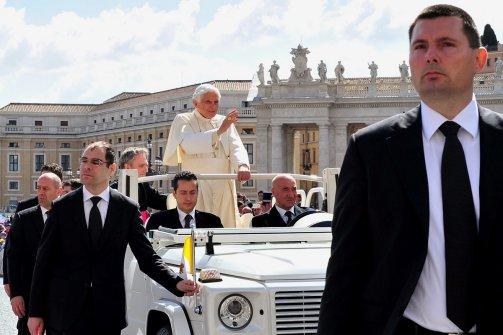Vatileaks Scandal Exposes Secrets of Pope's Empire
By Peter Popham
Pope Benedict XVI wakes every morning between 6:30 and 6:45 a.m. in the papal apartment on the third floor of the Vatican's Apostolic Palace, which overlooks St. Peter's Square. After bathing and shaving, he makes his way to his private chapel, where at 7:30 he celebrates the first mass of the day. After a time of private prayer in the chapel, at around 8:30 he joins Msgr. Georg Gänswein, his personal secretary, and a small circle of his closest collaborators for breakfast. The pope's preference is decaffeinated coffee, bread with butter and jam, and, once in a while, a slice of tart. We know all of these details because the Vatican has sprung a leak. For centuries one of the tightest organizations in the world, with a code of honor to rival that of the Sicilian Mafia, it has been turned inside out in the past six months. A gusher of highly confidential letters to the pope and his closest associates, many of them originally in code, has poured into the Italian media and into a book, Sua Santità by Gianluigi Nuzzi, which became an instant bestseller. The leaks are just one in a string of scandals to rock the Vatican this year—the latest, in early June, involved the ouster of the head of the Vatican bank, who possessed documents that apparently showed the Church circumventing European money-laundering regulations. To combat the spate of bad publicity, the Vatican has gone as far as hiring a former Fox News reporter, who happens to be an Opus Dei numerary, to be one of its official PR flacks. But whether the pope and the Vatican establishment can recover their credibility is now a matter of serious doubt. The target of the most damaging leaks is the most important and powerful figure in the Vatican besides the pope: the 77-year-old secretary of state Tarcisio Bertone. The leaks have been loudly condemned by the Vatican, and the man blamed for them—the pope's butler—may end up going to jail for years. But if the ambition that motivated the leaks was the sacking of Cardinal Bertone, they may yet succeed. Bertone's name recurs in letter after secret letter, as he plots to oust rivals as varied as the editor of the bishops' daily newspaper and the man sent in to clean up the Vatican's finances. Though Benedict is said to have turned down the cardinal's offer of resignation in late June, the informed consensus now is that Bertone's days are numbered. Though he may limp on into 2013, the leaks have done their corrosive work. When he was elected pope in 2005, Benedict could hardly have imagined such a brutal turn of events. For nearly 30 years, a tiny, painfully shy German cardinal named Joseph Ratzinger lived a few steps from St. Peter's, in an apartment whose bookish austerity was mitigated by two cats and a grand piano at which he would relax by playing Mozart sonatas. He was Pope John Paul II's trusted hard-line enforcer of theological issues. When the Polish pope finally died, Ratzinger could have looked forward to a well-deserved retirement. Instead, in April 2005, he was elected pope and propelled to instant, worldwide fame. From then on, every step he took and every public word he spoke would be news. In compensation, within the Apostolic Palace that became his new home, he could expect perfect discretion, total secrecy. But someone in his household had other ideas. "After the death of Karol Wojtyla"—John Paul II's baptismal name—"I started to put aside copies of certain documents of which I came into possession through my professional activities," wrote the anonymous author of the leaks. The speaker refused to reveal his name, adopting the code name "Maria" instead. He or she—along with others—had rebelled against a code of silence stretching back centuries. "In the first years I did it sporadically," Maria went on. "When I saw that the truth which was published in the newspapers and in official discourse did not correspond to the truth in these papers, I put them all to one side to try to go deeper and to understand. "In recent years the situation has worsened, hypocrisy reigns unchallenged. The scandals multiply ... In some moments in one's life, either you are a man or you aren't. The difference? Just the courage to say or do what you consider just. My courage was to make known the most agonizing events within the Church. To make public certain secrets, stories small and large which never get beyond those bronze gates." One of the biggest of those stories concerned the attempt of a courageous bishop to come to grips with the Vatican's finances. For two years Carlo Maria Viganò labored at the work, uncovering appalling scandal and waste. But in 2011, Cardinal Bertone gave Viganò his marching orders. Viganò wrote a top secret letter to the pope that was a cry of agony and rage. In the leaked letters, Viganò told the pope he could hardly believe what he discovered when he began combing through the Vatican's accounts. He went to work slashing grossly inflated budgets—for example, reducing the cost of the Vatican's lifesize nativity scene in the center of St. Peter's Square from $700,000 to $400,000; and saving more than $1 million in the maintenance of the gardens, which he funneled into renovating the pope's central heating system. In all, Viganò claimed to have converted a deficit of some $10 million into a surplus of $43.5 million. But in the process, he made powerful enemies, and on March 22, 2011, Bertone curtly told Viganò that he was fired. In his letter, Viganò pleaded with the pope to reverse the decision. "My transferral ... would provoke profound loss and discouragement in those who believed it was possible to clean up many situations of corruption and prevarication," he wrote. The Vatican, he claimed, was "a kingdom divided into little feudal states ... [a] chaotic, an unimaginable situation." But Benedict was unable to save Viganò; he was impotent to cross the will of Bertone. The indignant Viganò was instead dispatched to run the troubled Holy See's office in Washington D.C. Why was the pope so weak? When Ratzinger was elected to the office in 2005, it seemed that an ultimate insider had got the job—he had been in Rome at John Paul II's side for 24 years. He had just presided over the Polish pope's funeral, one of those stupendous shows at which the Vatican excels. Under a Roman sky of brilliant blue, the huge elliptical piazza was crammed with tens of thousands of pilgrims, and all the magnificence of the Catholic Church was on display—the celestial choirs, the ranks of priests and nuns from all over the world, and the cardinals in their trademark purple. At the center was the tiny figure of Benedict himself, all in white, with the future of the Church in his hands. Yet before becoming pope, Benedict had been a bookish introvert—his routine was fixed, and his circles of acquaintance very limited. His life was bounded by the walls of the Prefectural Congregation for the Doctrine of the Faith, formerly known as the Inquisition, which he headed. After his election, when the time came to make his most crucial appointment—that of the Vatican's second-in-command—he turned to Bertone, one of those who had served him faithfully in the past. It is hard to imagine a man more different from Benedict. A tall fellow with small eyes like coals and a smile that flashes on and off, Bertone is a football fanatic who instituted the Clericus Cup, a tournament between Catholic seminaries. (It may prove to have been his finest hour.) He is effectively monolingual; when he preached in Spanish to a New York congregation, a Spaniard who was present was convinced Bertone was speaking Italian. He has presided over one papal gaffe after another. Perhaps the worst came when priests who had been illegally made bishops by the ultraconservative French Bishop Marcel Lefebvre were told they would be welcomed back into the Church. The announcement coincided with a television interview in which one of them, Bishop Richard Williamson, declared that he believed the Nazi gas chambers were an invention. Yet what Bertone lacks in diplomatic finesse, he more than makes up in the efficiency with which he protects his own position. Bertone's job combines the powers of a foreign minister and a prime minister. Given the Babel of languages inside this most polyglot of institutions, and the fact that the Church must make its influence felt in countries as different and problematic as China, Russia, Israel, and Saudi Arabia, the position of secretary of state is an immensely demanding one. No close observer of the Vatican can understand why Bertone is in it, yet the pope refuses to get rid of him. To remove Bertone would be a grave admission of error that could undermine Benedict's own authority. When, in a private meeting four years ago, a leading bishop demanded Bertone's replacement, Benedict snapped, "Der Mann bleibt wo er ist, und basta!"—"The man stays where he is, and enough!" After becoming pope, Benedict had vowed to clean up the church. During John Paul II's long decline, venality and corruption had made terrible advances. He had his successes: in 2006, he removed Marcial Maciel, the Mexican founder of the highly conservative order, the Legionaries of Christ. After decades of being honored and held in high esteem, Maciel was exposed as a rapist, a pedophile, and a drug addict who had had families by two different women, and who abused his own children. Both Cardinal Angelo Sodano, Bertone's predecessor as secretary of state, and Bertone himself had once showered Maciel with accolades. (Maciel, who was ordered to spend the rest of his days in prayer and penance, died in 2008.) But many other venal figures have remained in positions of influence, beyond the reaches of a man with great powers of intellectual analysis but few political gifts. To pick one example, Cardinal Bernard Law of Boston, who appalled millions of American Catholics with his long cover-up of priestly pedophilia, was allowed to preside over Santa Maria Maggiore, one of the most important basilicas in Rome. While Benedict was not personally involved in the scandals involving Law or Maciel, he was tainted by the mere fact of having held high office while they were taking place, and having done nothing to stop them. Meanwhile, the Vatileaks scandal risks reducing the Church to impotence. No one yet knows for certain who is behind the leaks; the only person fingered so far is Paolo Gabriele, the pope's butler, who has been held for more than six weeks in a secure room in Vatican City. He has been charged with aggravated theft, which carries a sentence of one to six years, but could face other charges, including "causing offense or outrage to the figure of the pope." Whoever orchestrated the leaks, one of their principal goals was clearly to expose the corruption and skulduggery surrounding the Vatican's finances. The Church depends on the regular weekly donations from the faithful. Between 2009 and 2010, while the pedophilia scandal was raging, St. Peter's alone saw its income from offerings plummet from $82.5 million to $67 million, a drop of 20 percent. In 2011, the Vatican posted its first deficit in years, a loss of $19 million. The new revelations are likely to be just as damaging. Also at risk is the other thing that holds the Church together: free and frank communications inside the Vatican's walls. The tiny Vatican State—all 108 acres of it—has nearly 100 embassies. This flimsy and overextended structure, a cathedral made of matchsticks, depends for its survival on secure communications to and from priests, nuns, and bishops out in the field. Now they may hesitate to say what is on their minds lest it be splashed across the media. "Benedict is completely blocked now," says a German correspondent in Rome. "Everything he says is conditioned by this affair and the lack of confidentiality which has resulted. If you were a bishop with something important and confidential to say, would you write to him now?" Peter Popham has been a foreign correspondent and commentator at The Independent for more than 20 years. He is the author of The Lady and the Peacock: The Life of Aung San Suu Kyi. Barbie Latza Nadeau is Newsweek's Rome bureau chief and author of the Beast Book Angel Face, about Amanda Knox.
|
.
Any original material on these pages is copyright © BishopAccountability.org 2004. Reproduce freely with attribution.


